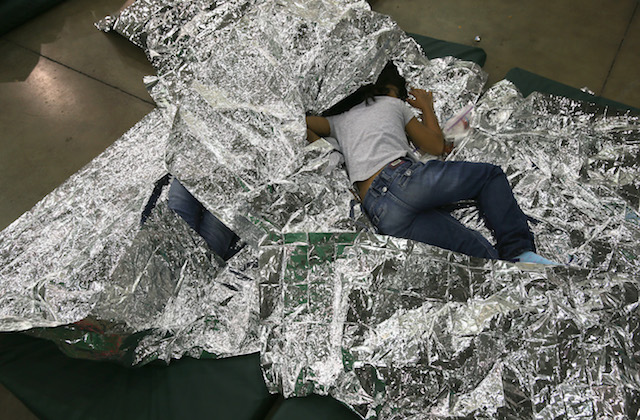'Terrorized': Report Details Conditions at Child Detention Centers

Frigid cells with foul-smelling drinking water. Children given rotten food and forced to sleep on concrete floors. No showers or clean clothes for days. Overflowing toilets in "dog houses." These are just a few of the things detained children highlighted about the facilities where they were held.
"It was cold, very cold. I only had a t-shirt so I pulled my hands inside my t-shit to try to keep warm. There were no mattresses. We slept directly on the floor," said Justin, a 13-yer-old immigrant from El Salvador. "I haven't been able to call my father since I was locked up. I want to tell him where I am, and I want to talk to him."
Justin's description of United Staets detention centers, and testimony from interviews with 200 other immigrant children and adults, are part of an extensive report filed in federal court this week in Los Angeles by the Center for Human Rights and Constitutional Law.
Dozens of pro bono lawyers and interpreters interviewed the immigrants at several Southwest centers run by U.S. Customs and Border Protection (CBP) and Immigration and Customs Enforcement (ICE) in June and July.
"They have spoken out loud and clear, and what they’ve said is they are experiencing enforced hunger, enforced dehydration, enforced sleeplessness," Peter Schey, executive director of the Center for Human Rights and Constitutional Law, told The Associated Press. "They are terrorized, and I think it is time for the courts and the public to hear their voices."
The Department of Homeland Security (DHS), which overseas the detention centers, reportedly did not respond to requests for comment.
The catalogue of complaints filed by immigration advocates describe conditions that violate child detention protocols as outlined in a 1997 settlement known at the Flores agreement, which also stipulates that children cannot be held in immigration detention for more than 20 days.
Schey is scheduled to argue in federal court on July 27 that detention conditions at facilities run by CBP and ICE fail to meet the basic standards laid out in the Flores agreement.
The report filed by Schey and his colleagues comes amid widespread outcry over the Trump administration's "zero tolerance" immigration policies, which have seen thousands of children separated from their parents after they cross the U.S.-Mexico border.
A federal judge in San Diego has ordered the federal government to reunite all children with their parents before July 26, a deadline the Department of Health and Human Services (HHS), the agency in charge of the children's care, says it is rushing to meet.
Despite reunification plans, lasting damage has likely already set in for many detained children. Psychologists say that the longer children remained separated from their parents and detained, the more likely they will suffer from depression and post traumatic stress.
"My daughter was very frightened and depressed all the time," Daise, a Honduran mother, said in the report, referring to her 16-year-old daughter, Keylin. "The female guards yelled at my daughter a lot, called her names and made fun of her and the other children. The female guards would not let her sleep and kicked her to keep her awake."
